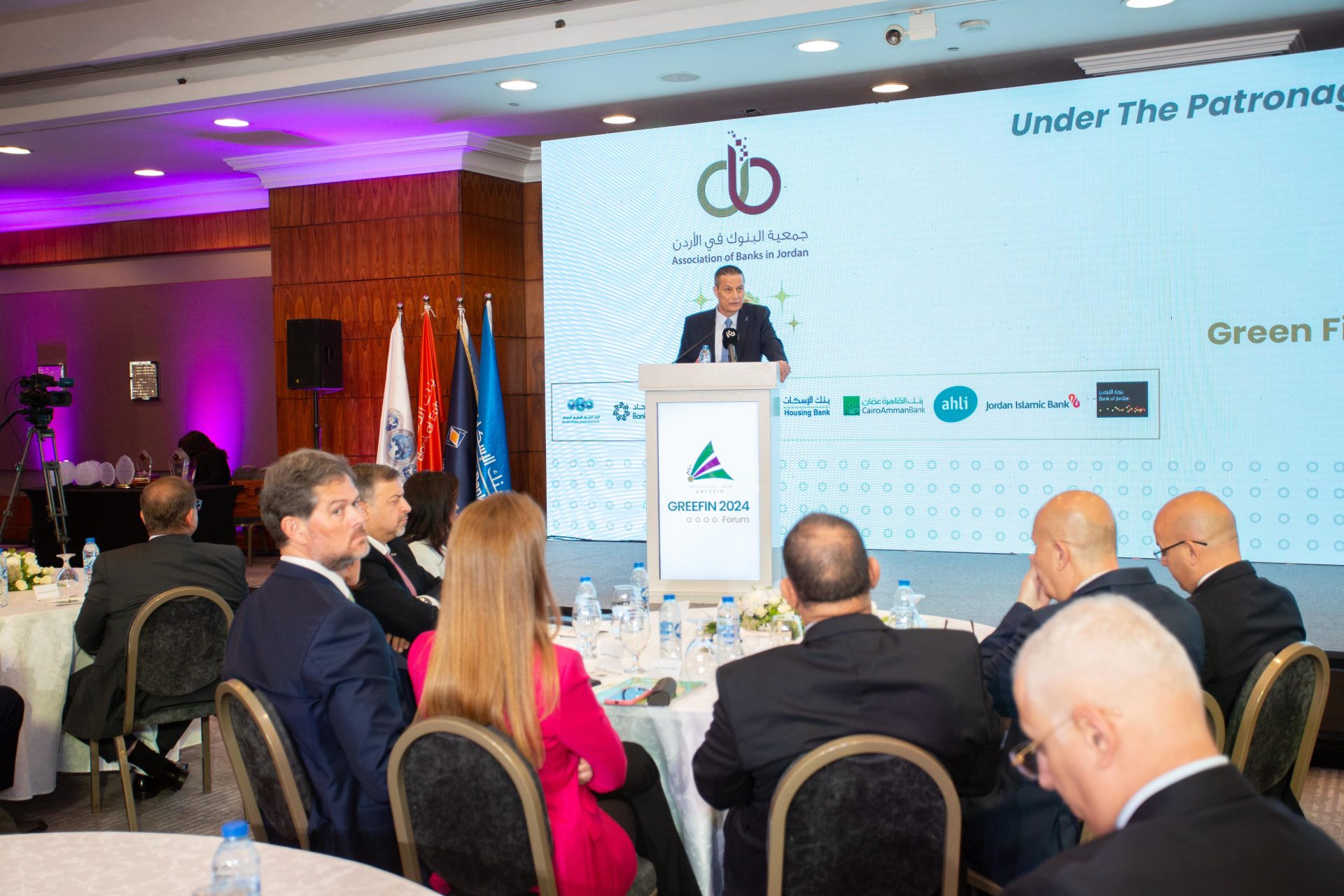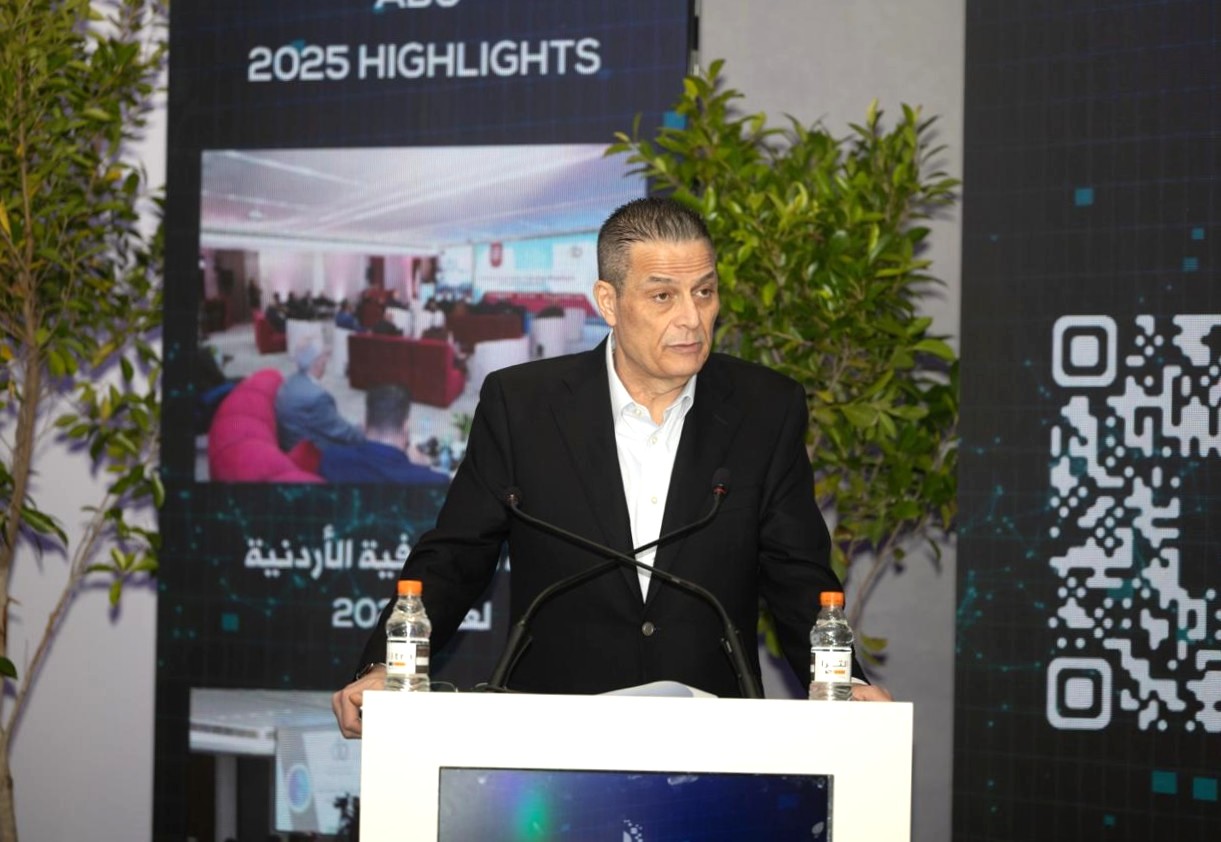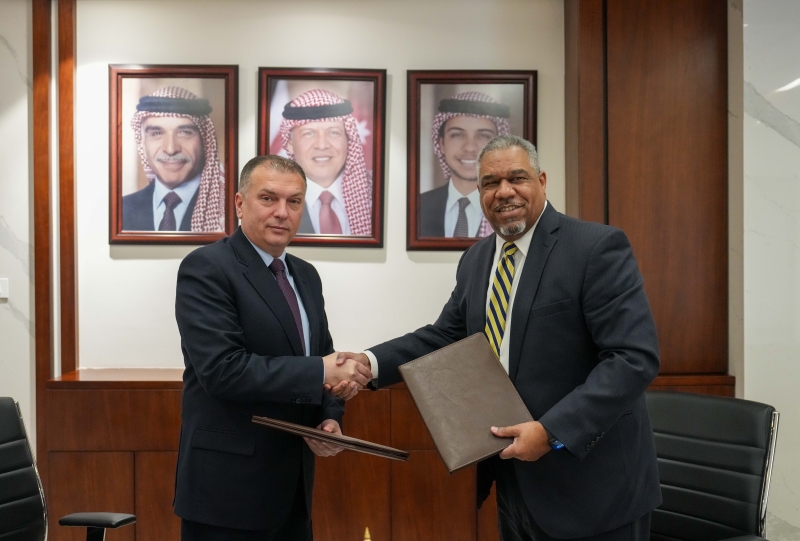
-Governor of the Central Bank: Green finance is a strategic necessity for the future of banking.
-Sharkas: The Central Bank of Jordan recognized early the importance of environmental preservation and the promotion of renewable energy.
-Fattouh: The role of financial institutions in promoting a sustainable future has become extremely important.
-Fattouh: Green finance and the allocation of financial resources are cornerstones providing the essential capital needed for projects that enhance environmental sustainability and economic resilience.
-Al-Safadi: Sustainability and green finance in the banking sector are pressing necessities for building the future of the banking sector.
-Al-Safadi: Transitioning to a sustainability approach in the banking sector will directly contribute to enhancing economic resilience and robustness.
-Al-Mahrouq: Greening the banking sector is an ongoing process linked to the implementation of the Central Bank’s Green Finance Strategy.
Under the patronage of Dr. Adel Sharkas, the Governor of the Central Bank of Jordan, the second edition of the Green Finance Forum ” GREEFIN 2024″ was launched today under the title ” Green Finance: A Strategic Necessity for Banking’s Future”. The forum was sponsored by eight banks: Bank of Jordan, Jordan Islamic Bank, Jordan Ahli Bank, Cairo Amman Bank, Housing Bank for Trade and Finance, Jordan Kuwait Bank, al-Etihad Bank, and Islamic International Arab Bank.
The event was attended by several banking leaders, the Secretary General of the Union of Arab Banks, Dr. Wissam Hassan Fattouh, and more than 180 participants from banks, various banking and economic sectors, government bodies, and relevant international organizations.
Dr. Adel Sharkas emphasized that climate change has become one of the most significant global issues due to its social, environmental, and economic risks. He stated that this important forum aims to enhance dialogue and cooperation within the banking sector and with other relevant entities to develop and activate green finance initiatives in the Kingdom.
Dr. Sharkas highlighted that climate change has garnered early and significant global attention, with various efforts to address its impacts and adapt to its potential effects on ecosystems and economic sectors. One of the key topics now is the impact of climate change on the financial sector, the associated risks, and how to identify, assess, and manage these risks.
He pointed out that managing climate change risks requires regulatory authorities to take exceptional measures, including integrating these risks into their regulatory and prudential policies. This integration will guide banks and financial institutions to include these risks in their business models, credit and investment policies, and risk management strategies, and commit to disclosing these risks while enhancing green finance.
He explained that the Central Bank of Jordan recognized early the importance of environmental preservation and the promotion of renewable energy, including the renewable energy sector and energy efficiency projects in its financing program to support economic sectors in 2013, believing in the importance of this sector in preserving the environment and expanding the use of clean energy in Jordan and mitigating the impact of climate change.
Additionally, the Central Bank launched the Green Finance Strategy (2023-2028) on November 13, 2023, prepared in cooperation with the World Bank and in coordination with the Association of Banks and the banking and financial sector and relevant stakeholders in both the public and private sectors. This strategy serves as a roadmap to enable the Central Bank and the financial sector to enhance green finance and reduce climate change risks, covering the banking sector, insurance companies, and microfinance institutions. This strategy is the first of its kind in the Middle East and North Africa region.
He mentioned that the Central Bank joined the global Network for Greening the Financial System on October 26, 2021, aiming to strengthen the global response required to achieve international climate agreements and enhance the financial system’s role in managing climate change risks and directing capital towards green and low-carbon investments.
Dr. Sharkas concluded his speech by thanking the Association of Banks, attendees, and organizers of this important forum, which will contribute to a better understanding of green finance practices, climate change risks, and their impact on the financial system. He expressed his hope that this forum would achieve tangible progress in this vital area.
Dr. Wissam Hassan Fattouh, Secretary General of the Union of Arab Banks, emphasized the importance of discussing green finance, a highly significant topic for our Arab region, during his speech at the Green Finance Forum 2024. He added that the common goal among the attendees is to promote sustainable development that meets present needs without compromising the ability of future generations to meet their own needs.
Dr. Fattouh explained that this conference discusses the critical intersection between finance, sustainability, and development in an era where the consequences of climate change and environmental degradation are increasingly evident. He pointed out the significant role financial institutions play in promoting a sustainable future, stating that green finance is a crucial means to achieve sustainable growth and address the urgent challenges posed by climate change.
He further elaborated that our Arab countries face unique environmental challenges, including water scarcity, desertification, and the impacts of climate change, which require urgent and coordinated responses. Thus, the need for sustainable development has become an urgent reality. Green finance and the allocation of financial resources are cornerstones of this response, providing the essential capital for projects that enhance environmental sustainability and economic resilience, such as investments in renewable energy, energy efficiency, sustainable agriculture, and green infrastructure.
Dr. Fattouh noted that the Arab countries face significant challenges in unlocking the potential of green finance, including regulatory and policy frameworks. Despite progress, there are still regulatory and policy barriers that hinder the full potential of green finance in the Arab region, such as insufficient incentives like interest support and some tax exemptions that lead to investor hesitation in committing to green projects.
He spoke about the importance of raising awareness of the benefits of green finance and building capacity among stakeholders, including banks, financial institutions, companies, and policymakers, highlighting the urgent need for awareness and understanding. Dr. Fattouh thanked the Association of Banks in Jordan for organizing this forum.
He stressed that access to finance is a major challenge, especially for small and medium-sized enterprises, which play a crucial role in Arab economies. Developing innovative financing mechanisms and mitigating risks from investments are essential to ensure the inclusivity and accessibility of green finance.
Dr. Fattouh highlighted the significant role played by the Union of Arab Banks in the topics of green finance, sustainable finance, and broader development finance. He justified the initiative launched by the Union in September 2023 to encourage Arab banks and financial institutions to allocate one trillion dollars for financing sustainable development.
In conclusion, Dr. Fattouh praised Jordan’s commitment to green finance initiatives, citing the National Green Growth Plan launched in 2017, renewable energy projects, green bonds, the Jordan Renewable Energy and Energy Efficiency Fund, and public-private partnerships. He expressed his hope that these efforts would contribute to building a resilient and prosperous future for future generations.
Mr. Ammar Al-Safadi, Vice President of the Association of Banks in Jordan, stated that the Green Finance Forum “GREEFIN” is an annual forum launched by the Association in 2023. It highlights green finance and aims to enhance dialogue and cooperation frameworks between various government and private entities and the banking sector to support and promote green finance and sustainability initiatives in the Kingdom.
In his opening remarks, Al-Safadi emphasized the importance of sustainability in the banking sector as a comprehensive approach that will help preserve the future for coming generations and its role in building a strong and resilient economy. This approach directly contributes to enhancing the economic resilience and robustness of our national economy, improving economic growth levels, and maintaining the banking sector’s reputation as a sound and secure sector.
He stated that the move towards sustainability and green finance has become one of the pressing necessities for building the future of the banking sector, aligning with the Economic Modernization Vision. Al-Safadi pointed out the continued achievement of sustainable growth rates in key banking indicators, highlighting the financial strength and resilience of the banking sector by referring to financial soundness indicators.
Al-Safadi praised Moody’s announcement to upgrade Jordan’s long-term government credit rating from B1 to Ba3, marking the first time in 21 years that Moody’s has upgraded Jordan’s rating. This reflects the prudence of fiscal and monetary policies followed by the Central Bank, and Al-Safadi expected that the move towards sustainability and green finance would enhance and sustain this achievement in the future.
The forum included several specialized sessions exploring the nature of green and sustainable finance and the transition to a sustainability approach in the banking sector. The opening session, titled “Green Finance: Importance and Trends,” featured Mr. Jason Channell, Managing Director, Head of Sustainable Finance, at Citi Global Insights, who discussed the importance of green finance, global trends, market trends in green finance, and the noticeable increase in global demand for sustainable financial solutions, especially those linking environmental solutions with the banking business environment. Mr. Channell also emphasized the importance of adopting a medium- to long-term strategic sustainability approach, presenting the appropriate comparison of the benefits and returns of the transformation approach versus the costs of sustainable transformation.
The first session of the forum, which discussed the integration of green finance into banking operations and was managed by Eng. Ruba Zubi, Energy, Climate, and Development Officer at the British Foreign, Commonwealth & Development Office, focused on the factors influencing the transformation process. Mr. Andrius Skarnulis, Senior Financial Economist for Finance, Competitiveness, and Innovation at the World Bank, spoke about a holistic view of green finance at the regional and global levels. Mr. Jan Ennenbach, Senior Advisor Financial Systems Development at GFA Consulting Group, and Ms. Shada Sharif, Policy Expert on Green Economy & Deputy Team Leader at GIZ Jordan, discussed tools and mechanisms for designing and developing green financial instruments and loans, investment opportunities, and the importance of encouraging consumer behavior towards green technologies. Mr. Vincent Duijnhouwer, Head of Green Financial System, Southern and Eastern Mediterranean Region (SEMED) at EBRD, presented international experiences and ways to accelerate green finance by showcasing success stories and illustrating successful banking operations.
The forum included a sub-session dedicated to the industrial sector in Jordan, where engineer Maen Ayasrah talked about green finance opportunities in the industrial sector, the nature and diversity of opportunities available in various industrial sub-sectors, and how these can be financed through the banking sector.
The second session of the forum addressed green finance risk management practices, chaired by Dr. Rasmi Hamzeh, Executive Director of the Jordan Renewable Energy and Energy Efficiency Fund (JREEEF). Mr. Mert Dedebas, Regional Director of the Frankfurt School of Finance & Management’s Office for the Middle East and North Africa, discussed the technical aspects of green finance in the banking sector, elements of environmental risk assessment, and their integration into credit analysis models to enhance credit decisions, ensure portfolio sustainability, and reduce the chances of greenwashing. Mr. Mohammad Amaireh, Head of Financial Stability at the Central Bank of Jordan, talked about the Central Bank’s approach to implementing the green finance strategy and ways to enhance the risk governance structure related to green finance in the banking sector, covering aspects such as supervision, measurement, monitoring, and managing environmental and climate change risks.
At the conclusion of the forum, Dr. Maher Al-Mahrouq, Director General of the Association of Banks, presented the forum’s final statement, highlighting the Association’s role in enhancing and building communication frameworks with all entities to promote the transition towards sustainability in the banking sector. He emphasized the Association’s efforts in capacity building and delving deeper into topics of sustainability and green finance to empower banking leaders to drive this transformation.
Al-Mahrouq pointed out that the banking sector’s leadership in the transformation process will help boost the shift of economic sectors towards green activities, which will bring numerous benefits to the local economy by transitioning towards a green and sustainable economy, thereby enhancing economic growth levels.
Al-Mahrouq also mentioned that greening the banking sector is an ongoing process linked to the implementation of the Central Bank’s Green Finance Strategy for the years 2023-2028 and the Economic Modernization Vision, which has made sustainability one of its core pillars. He affirmed that the Association looks forward to leveraging the positive momentum provided by the forum participants and relying on subsequent recommendations to develop and enhance the sustainability approach in banks. This will contribute to Jordan making significant strides in greening economic sectors and promoting the shift towards a green and circular economy.
[URIS id=16845]





